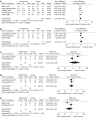Effect of dietary fiber on constipation: a meta analysis
- PMID: 23326148
- PMCID: PMC3544045
- DOI: 10.3748/wjg.v18.i48.7378
Effect of dietary fiber on constipation: a meta analysis
Abstract
Aim: To investigate the effect of dietary fiber intake on constipation by a meta-analysis of randomized controlled trials (RCTs).
Methods: We searched Ovid MEDLINE (from 1946 to October 2011), Cochrane Library (2011), PubMed for articles on dietary fiber intake and constipation using the terms: constipation, fiber, cellulose, plant extracts, cereals, bran, psyllium, or plantago. References of important articles were searched manually for relevant studies. Articles were eligible for the meta-analysis if they were high-quality RCTs and reported data on stool frequency, stool consistency, treatment success, laxative use and gastrointestinal symptoms. The data were extracted independently by two researchers (Yang J and Wang HP) according to the described selection criteria. Review manager version 5 software was used for analysis and test. Weighted mean difference with 95%CI was used for quantitative data, odds ratio (OR) with 95%CI was used for dichotomous data. Both I(2) statistic with a cut-off of ≥ 50% and the χ(2) test with a P value < 0.10 were used to define a significant degree of heterogeneity.
Results: We searched 1322 potential relevant articles, 19 of which were retrieved for further assessment, 14 studies were excluded for various reasons, five studies were included in the analysis. Dietary fiber showed significant advantage over placebo in stool frequency (OR = 1.19; 95%CI: 0.58-1.80, P < 0.05). There was no significant difference in stool consistency, treatment success, laxative use and painful defecation between the two groups. Stool frequency were reported by five RCTs, all results showed either a trend or a significant difference in favor of the treatment group, number of stools per week increased in treatment group than in placebo group (OR = 1.19; 95%CI: 0.58-1.80, P < 0.05), with no significant heterogeneity among studies (I(2)= 0, P = 0.77). Four studies evaluated stool consistency, one of them presented outcome in terms of percentage of hard stool, which was different from others, so we included the other three studies for analysis. Two studies reported treatment success. There was significant heterogeneity between the studies (P < 0.1, I(2) > 50%). Three studies reported laxative use, quantitative data was shown in one study, and the pooled analysis of the other two studies showed no significant difference between treatment and placebo groups in laxative use (OR = 1.07; 95%CI 0.51-2.25), and no heterogeneity was found (P = 0.84, I(2)= 0). Three studies evaluated painful defecation: one study presented both quantitative and dichotomous data, the other two studies reported quantitative and dichotomous data separately. We used dichotomous data for analysis.
Conclusion: Dietary fiber intake can obviously increase stool frequency in patients with constipation. It does not obviously improve stool consistency, treatment success, laxative use and painful defecation.
Keywords: Constipation; Dietary fiber; Meta-analysis; Stool consistency; Stool frequency.
Figures
Similar articles
-
Cochrane Review: Osmotic and stimulant laxatives for the management of childhood constipation (Review).Evid Based Child Health. 2013 Jan;8(1):57-109. doi: 10.1002/ebch.1893. Evid Based Child Health. 2013. PMID: 23878124 Review.
-
Laxative effects of wheat bran and psyllium: Resolving enduring misconceptions about fiber in treatment guidelines for chronic idiopathic constipation.J Am Assoc Nurse Pract. 2020 Jan;32(1):15-23. doi: 10.1097/JXX.0000000000000346. J Am Assoc Nurse Pract. 2020. PMID: 31764399 Review.
-
Fermented Fiber Supplements Are No Better Than Placebo for a Laxative Effect.Dig Dis Sci. 2016 Nov;61(11):3140-3146. doi: 10.1007/s10620-016-4304-1. Epub 2016 Sep 28. Dig Dis Sci. 2016. PMID: 27680987 Review.
-
Effects of dietary fibers or probiotics on functional constipation symptoms and roles of gut microbiota: a double-blinded randomized placebo trial.Gut Microbes. 2023 Jan-Dec;15(1):2197837. doi: 10.1080/19490976.2023.2197837. Gut Microbes. 2023. PMID: 37078654 Free PMC article. Clinical Trial.
-
The treatment of chronic constipation in adults. A systematic review.J Gen Intern Med. 1997 Jan;12(1):15-24. doi: 10.1046/j.1525-1497.1997.12103.x. J Gen Intern Med. 1997. PMID: 9034942 Free PMC article.
Cited by
-
Nutraceuticals for geriatrics.J Tradit Complement Med. 2014 Dec 17;5(1):5-14. doi: 10.1016/j.jtcme.2014.10.004. eCollection 2015 Jan. J Tradit Complement Med. 2014. PMID: 26151003 Free PMC article. Review.
-
The relative role of soil, climate, and genotype in the variation of nutritional value of Annona senegalensis fruits and leaves.Heliyon. 2023 Aug 7;9(8):e19012. doi: 10.1016/j.heliyon.2023.e19012. eCollection 2023 Aug. Heliyon. 2023. PMID: 37636399 Free PMC article.
-
Parkinson's disease: Are gut microbes involved?Brain Behav. 2023 Aug;13(8):e3130. doi: 10.1002/brb3.3130. Epub 2023 Jun 20. Brain Behav. 2023. PMID: 37340511 Free PMC article. Review.
-
The effects of fresh mango consumption on gut health and microbiome - Randomized controlled trial.Food Sci Nutr. 2023 Feb 1;11(4):2069-2078. doi: 10.1002/fsn3.3243. eCollection 2023 Apr. Food Sci Nutr. 2023. PMID: 37051355 Free PMC article.
-
The Efficacy of Lubiprostone in Patients of Constipation: An Updated Systematic Review and Meta-Analysis.JGH Open. 2025 Jan 15;9(1):e70070. doi: 10.1002/jgh3.70070. eCollection 2025 Jan. JGH Open. 2025. PMID: 39822339 Free PMC article. Review.
References
-
- Higgins PD, Johanson JF. Epidemiology of constipation in North America: a systematic review. Am J Gastroenterol. 2004;99:750–759. - PubMed
-
- Watanabe T, Nakaya N, Kurashima K, Kuriyama S, Tsubono Y, Tsuji I. Constipation, laxative use and risk of colorectal cancer: The Miyagi Cohort Study. Eur J Cancer. 2004;40:2109–2115. - PubMed
-
- Xing JH, Soffer EE. Adverse effects of laxatives. Dis Colon Rectum. 2001;44:1201–1209. - PubMed
-
- Wald A. Is chronic use of stimulant laxatives harmful to the colon? J Clin Gastroenterol. 2003;36:386–389. - PubMed
Publication types
MeSH terms
Substances
LinkOut - more resources
Full Text Sources
Medical
Research Materials
Miscellaneous



